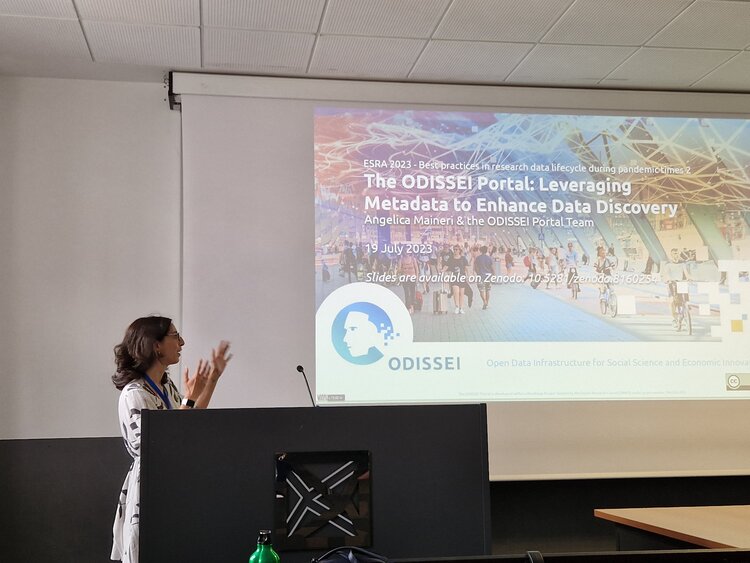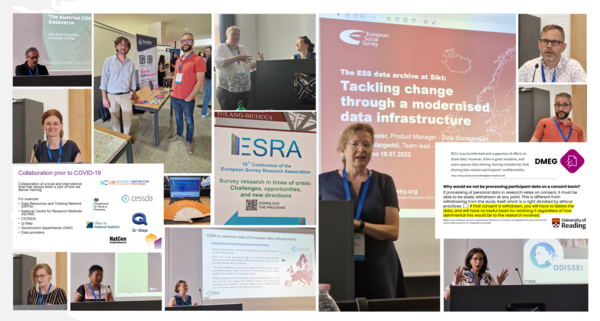
Empowering Research: CESSDA's Presence and Contributions at ESRA 2023
European Survey Research Association recently hosted its first in-person conference post-COVID pandemic in July, during which all participants were excited to showcase the progress made over the past years. CESSDA put forward two sessions focused on "Best Practices in Research Data Management Amidst the Pandemic," aiming to provide a platform for discussions on fresh innovations, tools, and services that can enhance the research journey, increase transparency, and amplify the accessibility and visibility of research outputs.
Eight speakers gathered in sunny Milan, Italy. The two CESSDA sessions were moderated by Irena Vipavc Brvar, CESSDA Training working group lead.
Challenges and Adaptations Amidst the Pandemic
Roman Auriga, from Leibniz Institute for Educational Trajectories (LIfBi) discussed experience with managing large-scale panel surveys, the German National Educational Panel Study (NEPS), during the COVID-19 pandemic. COVID profoundly impacted survey operations, posing challenges due to its unpredictability and transience. The team had to revamp collection strategies, adopt remote data gathering methods (e.g., online competence testing), refine validation processes, adjust study designs, and create new questionnaire modules and interviewer training formats. While this approach increased participant engagement and facilitated remote collaboration, it elevated project and knowledge management requirements, necessitating robust technical infrastructure and reliable internet access. However, the shift to remote work revealed issues like reduced social interaction and the absence of informal exchanges among interviewees and team members. The full impact of this new mode on the collected data remains uncertain.
Collaboration Between Researchers and Data Repositories
Domingo Scisci, from the Data Archive for Social Science in Italy, University of Milano-Bicocca (DASSI), presented a use case of collaboration between researchers and data repository throughout the whole research life-cycle. In the "Italian Lives - ITA.LI" panel survey, the archive served as data stewards, aiding in consent and privacy documentation, acting as liaisons with the university's Data Protection Officer, and establishing efficient data preparation workflows. Challenges included the need for specialized skills (JSON, Git) and balancing research needs with long-term preservation. COVID-19 added complexity, necessitating online documentation and remote code development. Promoting Open Science awareness is crucial as researchers often stick to familiar practices.
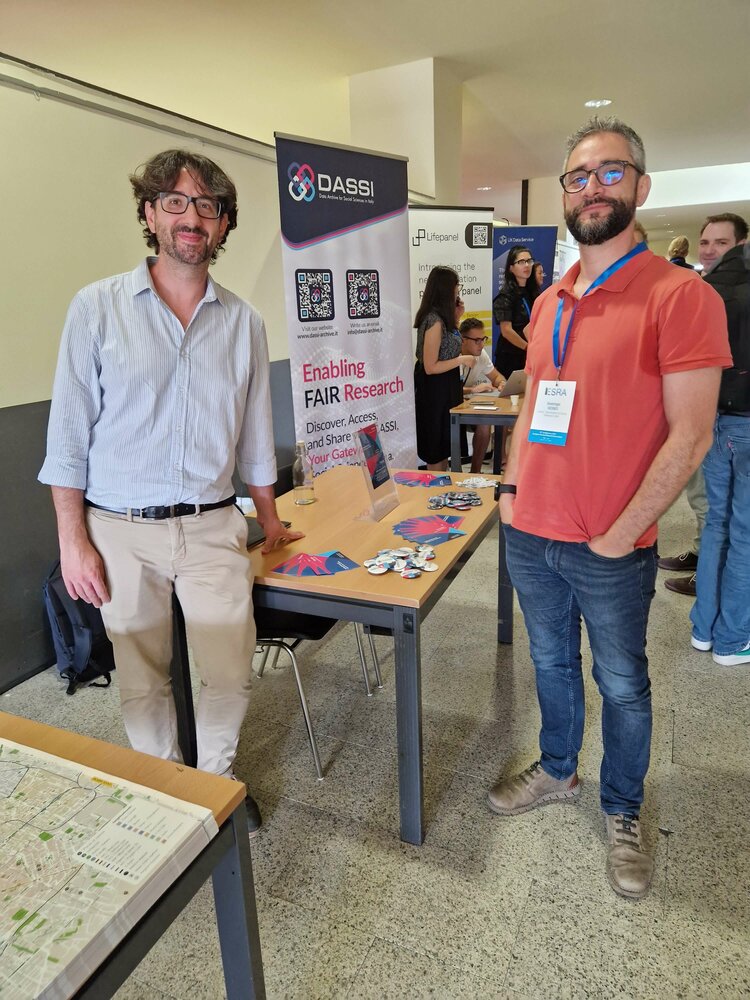
DASSI from Italy participated both in CESSDA session an presented their archive in a both at their host university Milano-Bicocca
Mobilizing Data Repositories for COVID-19 Response
Sonja Bezjak, from Slovenian Social Science Data Archives, University of Ljubljana (ADP) presented challenges that arose when creating special COVID-19 data collection in ADP. Data repositories quickly mobilised to address COVID-19 issues, identifying relevant epidemic data and fast-tracking publication. Collaborating researchers were eager to contribute, but early data sometimes had lower quality due to ad hoc, unfunded projects using non-probability samples. Archives faced challenges with unclear consent and limited time for documentation. Effective project management influences data sharing, emphasising the need to involve repositories early for best practices and smoother processes.
Supporting Researchers During the Pandemic
Alle Bloom, from UK Data Service, University of Manchester (UKDS), presented yet another response of data services to the COVID-19 pandemic. Data services play an important role in data reuse. UKDS training team created special training resources and delivered events to help equip researchers with the knowledge and skills to access and use survey data at this time. This included collaboration on the international events on data discovery (under CESSDA’s consortium umbrella), promotion of data discovery and good research practice with the CESSDA Data Management Expert Guide, creating guides to help researchers undertaking secondary survey research in pandemic times, and producing an Understanding Society COVID-19 teaching dataset to train future researchers. In order to deliver the content efficiently and quickly, several people with different knowledge, including the original research team, needed to be pulled together.
Data Repository as a Research Partner
Yana Leontiyeva, from the Institute of Sociology of the Czech Academy of Sciences, Czech Social Science Data Archive (CSDA), presented another use case in which the data archive gets heavily involved in the project as a partner. In response to the onset of the COVID-19 pandemic, a longitudinal survey project called Life During the Pandemic commenced in the Czech Republic. CSDA assumed a dual role as a data repository and a research partner, actively contributing to research topics and collaborating in the research process. They also took charge of coordinating data collection across 15 waves spanning from 2021 to 2025. Furthermore, the archive ensured that data and metadata were translated into English and made accessible through the CESSDA Data Catalogue and the BY-COVID portal. A broader project objective is to establish best practices for managing data in situations requiring swift responses to abrupt changes.
Challenges in Managing Data Collection During the Pandemic
Bodil Agasøster and Archana Bidargaddi, representing the Norwegian Agency for Shared Services in Education and Research (Sikt), discussed challenges faced during the COVID-19 pandemic in managing data collection and storage for the European Social Survey (ESS), the largest social science survey. In February 2020, preparations were underway in 32 ESS countries for fieldwork scheduled for September 2020. The pandemic introduced uncertainty regarding its duration and impact on data collection processes. This period involved delayed multi-modal fieldwork and substantial preparations for various collection methods. Concurrently, a new cloud-based infrastructure for research data management, data presentation, and visualization was developed and implemented from a data archive perspective.
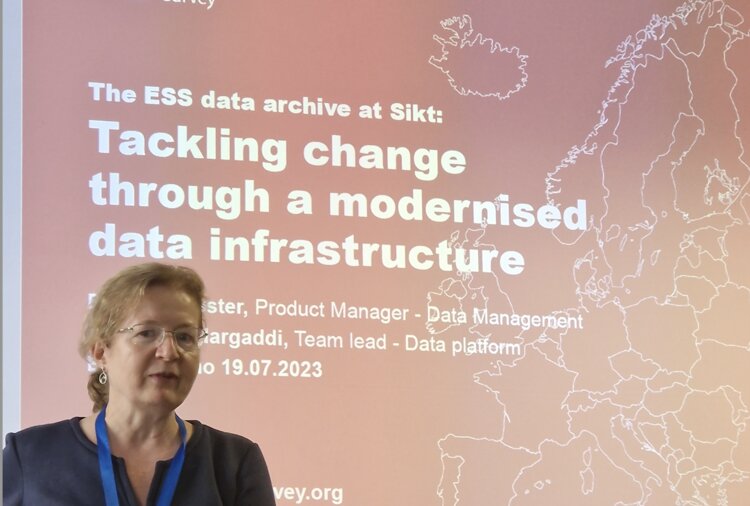
SIKT, a Service Provider to both CESSDA and ESS ERICs, presenting their challenges in COVID-19 and a solutions
Enhancing Data Discovery Through Metadata
Angelica Maria Maineri, from Erasmus University Rotterdam, informed us about how The ODISSEI Portal is looking into leveraging metadata to enhance data discovery. Social research faces challenges due to diverse, scattered data sources lacking standards. The ODISSEI Portal resolves this by consolidating data with enriched metadata. This metadata, enhanced by multilingual thesauri, fuels advanced searches via a knowledge graph. A data access broker validates user dataset requests. The ODISSEI Portal improves data access, supports FAIRness, and aids social scientists in addressing complex issues, especially in tough times.
The ODISSEI Portal consolidates data with enriched metadata
Archiving and Sharing Data During a Pandemic
Otto Bodi-Fernandez, from the University of Graz, presented the creation of the Austrian COVID-19 Pandemic Dataverse at the Austrian Social Science Data Archive and their response to archiving and sharing of data in times of pandemic. He presented the challenges and experiences of fast-track data publishing and used the example of survey projects such as the Austrian Corona Panel Project (ACPP) or the international Values in Crisis (VIC) study to show how collaboration between researchers, data stewards and archivists can work successfully.
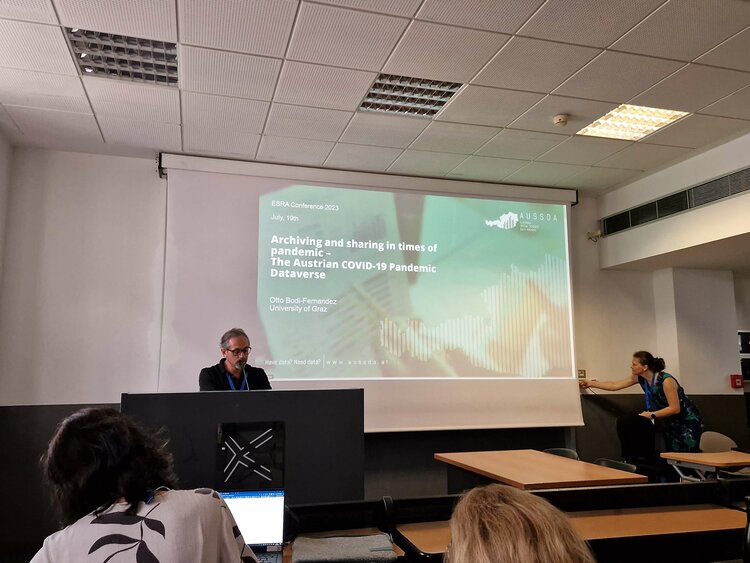
AUSSDA discussing the archiving and sharing in times of pandemic
CESSDA's Contributions at ESRA 2023 Poster Session
Additionally, during the poster session, CESSDA showcased two posters. The first highlighted the SSH Open Marketplace, a flagship initiative of the Social Sciences and Humanities Open Cloud project, now overseen by the SSHOC Cluster. Irena Vipavc Brvar, representing UL-ADP in Slovenia, offered valuable insights into the utilization of tools, methodologies, and standards within European Survey Research communities.
In another project in which CESSDA is actively engaged, Yana Leontyeva from CSDA in Czechia emphasized the significance of socioeconomic data in cross-domain collaborations, exemplified by the BY-COVID project. The presentation underscored the role of CESSDA archives in establishing infrastructure for a more comprehensive approach to infectious disease research and a swifter response to future crises, thereby contributing to advancements in healthcare investigations using social sciences data.
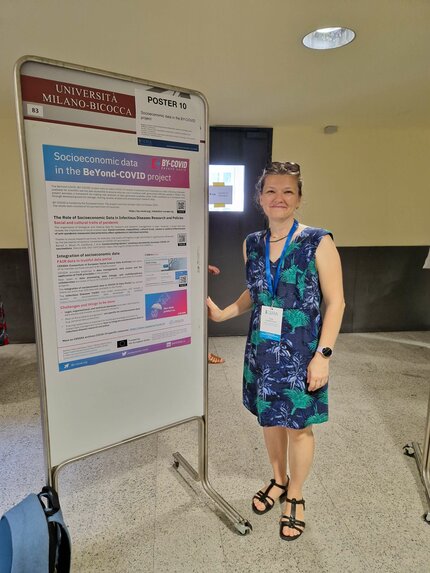
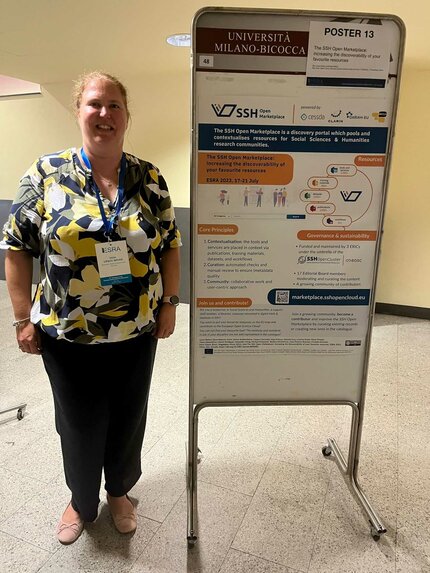
Two CESSDA posters presentations at ESRA 2023
In summary, ESRA 2023 offered a platform for fruitful discussions. Presenters showcased various initiatives of collaborating between researchers and data repositories, addressing COVID-19 data challenges, enhancing data discovery through metadata, and establishing a knowledge-based portal for advanced data searches. These endeavours underscore the importance of efficient data management, collaboration, and adaptability in navigating the complexities of today's research landscape, especially in times of disruption and unexpected world occurrences.
